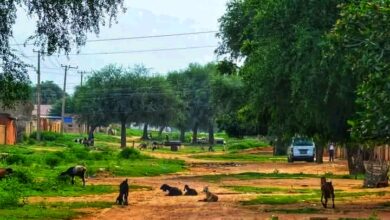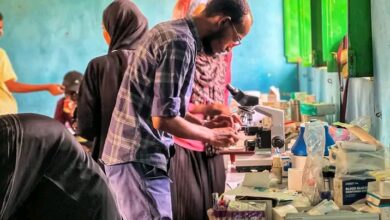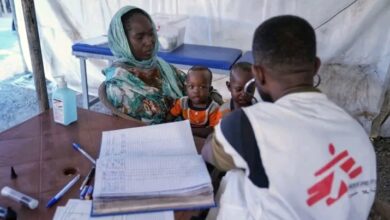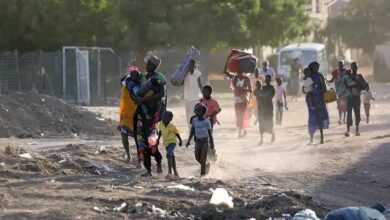The Deaf and Mute in Sudan: Silent Suffering Amid the War’s Fallout
Report – Mashawir
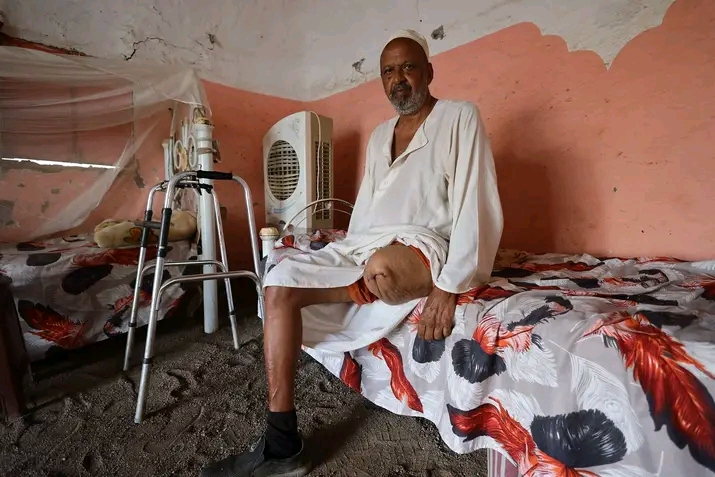
People with disabilities—including those with physical, auditory, visual, and intellectual impairments—are plagued with growing anxiety amid Sudan’s ongoing conflict. The deaf and mute, in particular, endure a “silent pain” as they become increasingly cut off from society due to the collapse of rehabilitation centers that once provided medical and educational services, along with psychological and social support to ease integration and overcome stigma. Their suffering is intensified in displacement areas, where even the most basic necessities for survival are lacking.
A significant segment of the Sudanese population with hearing and speech impairments faces bullying when trying to communicate through sign language, which many—including children—do not understand. The danger is even greater in war zones, where their inability to hear gunfire and shelling has tragically cost many their lives. In addition, the war has robbed them of their livelihoods.
Poverty and Displacement
Most of the deaf and mute in Sudan live in poverty due to limited employment opportunities in both the public and private sectors, despite many being educated. Their fundamental human rights, as outlined in local and international conventions, remain largely unfulfilled.
Since fighting erupted in the capital, Khartoum, in mid-April 2023, all institutions dedicated to people with disabilities have ceased operations. An estimated 4.1 million Sudanese—around 4.6% of the total population—live with disabilities, according to the latest census in 2008. More recent studies suggest that hearing-impaired individuals make up more than 35% of this group, or about 470,000 people, according to the Sudanese Deaf Union.
Meanwhile, four rehabilitation centers across three states have issued urgent appeals as they struggle to support an influx of displaced persons with disabilities, including the deaf and mute fleeing war-ravaged Khartoum. These facilities suffer from extreme shortages of hearing diagnostic equipment, trained medical personnel, and teachers skilled in sign language. The war has dashed their hopes for recovery and education, leaving them facing an uncertain future.
Social Isolation
Sumaya Abdelrahman, the mother of Mohamed, a child with hearing loss, shared: “My pregnancy was complicated by health issues. The doctor had warned me via ultrasound that my baby might be born with some defects—possibly in vision or hearing—due to persistent high fever. I feared bringing a child with a disability into a country with a collapsing economy.”
She continued: “When he was one, I noticed he wasn’t responding to sounds. That’s when I realized the doctor had been right—it was hearing loss. We began a long journey of treatment. When it came time for him to attend school, integration into mainstream education wasn’t feasible. We turned to specialized rehabilitation centers in Khartoum, especially the International Center for Advanced Hearing, which provided full medical, educational, and psychosocial services, giving us hope.”
“But the war shattered that hope. Displacement disrupted his care, and in refugee camps, communication has become nearly impossible. Many people aren’t receptive to these vulnerable groups, and bullying has become a regular ordeal for him due to others’ inability to understand sign language.”
Sumaya added, “My son was scheduled for cochlear implant surgery, but specialized hospitals have shut down, many located in central Khartoum where fighting is intense. We decided to travel to Egypt illegally, but during the chaotic journey, his hearing aid fell off due to the speed and overcrowding of the vehicle. Replacing it is nearly impossible—it costs about 600,000 Sudanese pounds (roughly 400 USD), far beyond our means as life continues to deteriorate.”
“Provincial centers, like the ones we visited before Wad Madani was overrun, lack qualified staff. Seeing a doctor often requires long waits and unaffordable fees. International and local organizations that once provided hearing aids and support have ceased their operations due to the war,” she concluded.
Silent Suffering
Psychologist Asmaa Mohamed Jumaa explained, “The problems faced by the hearing-impaired have doubled during the war. They cannot hear news about the conflict or the sounds of violence, making them highly vulnerable. They constantly require alerting and assistance.”
“The closure of rehabilitation and training centers has severely affected their development. These individuals had real potential for improvement, both mentally and socially, if only given the chance. They now require urgent psychological and financial support to resume their interrupted lives.”
She emphasized the importance of “creating recreational spaces in displacement camps. Many among the deaf community are talented artists, actors, and painters. We must also work to reduce fear and mistrust through visits from mental health and social professionals.”
An Uncertain Fate
Social activist Wafaa Awad said, “The harsh conditions in the country call for collective efforts to support vulnerable groups, especially those with disabilities. The war has intensified their suffering.”
“We launched several initiatives that initially received good support from donors and collaborated closely with the Ministry of Social Welfare and rehabilitation centers in Khartoum. But prices for hearing aids, batteries, and modern diagnostic devices—mostly imported—have skyrocketed. The armed conflict has paralyzed this support network. Activists in emergency rooms in displacement zones have stepped in to fill the gap and keep hope alive,” she added.
Awad noted that “many families of hearing- and speech-impaired children still hold onto hope for their recovery, especially for younger kids. Wealthier families have managed to leave Sudan in search of better treatment environments abroad.”
Alarming Statistics
According to the Sudanese Ministry of Education, people with disabilities have long suffered in the country’s struggling education system—conditions that worsened dramatically with the war.
There are roughly 140 educational institutions for people with disabilities across the country—79 private and 61 public. Due to the conflict, 14,400 students with hearing impairments have been cut off from rehabilitation programs.
Limited Resources
Takwa Amer, director of a center for the deaf in River Nile State, said the war forced the closure of seven rehabilitation centers in Khartoum that served thousands of hearing-impaired individuals.
“Centers in Atbara and Shendi (River Nile State), as well as in Kassala and the Red Sea State, are overwhelmed by the influx of displaced persons. We face challenges such as a shortage of sign language specialists and a severe lack of resources due to the state’s focus on the war.”
“Previously, our centers held workshops and seminars to raise awareness and reduce social barriers. Now, even when such programs exist, they’re seen as marginal. Employment opportunities remain scarce, leaving 60% of the deaf and mute living below the poverty line. Yet, these centers once inspired hope, showing that those with disabilities could contribute meaningfully to society—they possess rare and valuable traits.”
She concluded, “Displacement inside and outside Sudan has worsened their plight. Many lost their hearing aids and missed cochlear implant surgeries due to the war’s destruction of hospitals. We must urgently refocus humanitarian aid on this vulnerable group, especially as the scale of the problem continues to outstrip available resources.”

